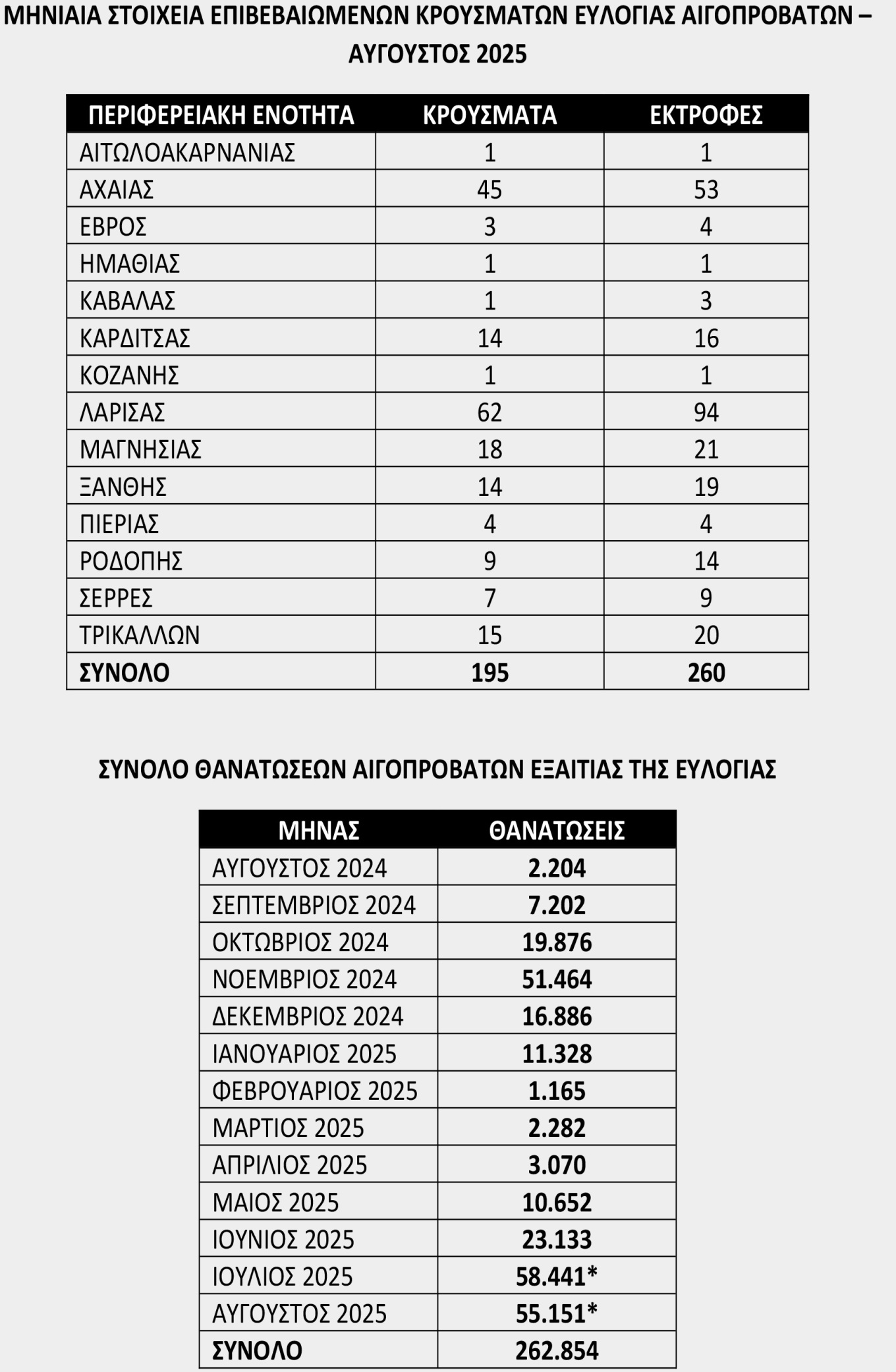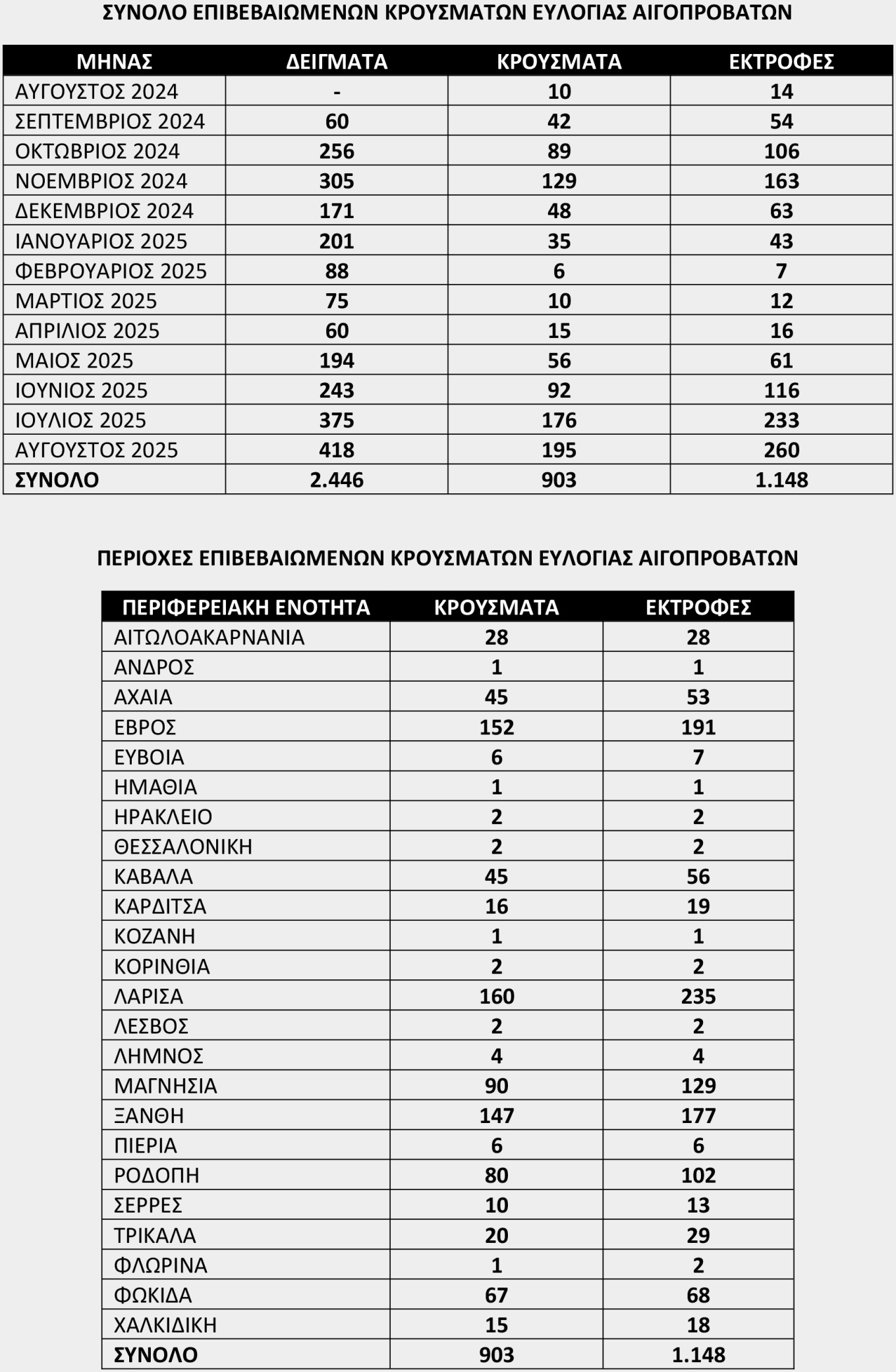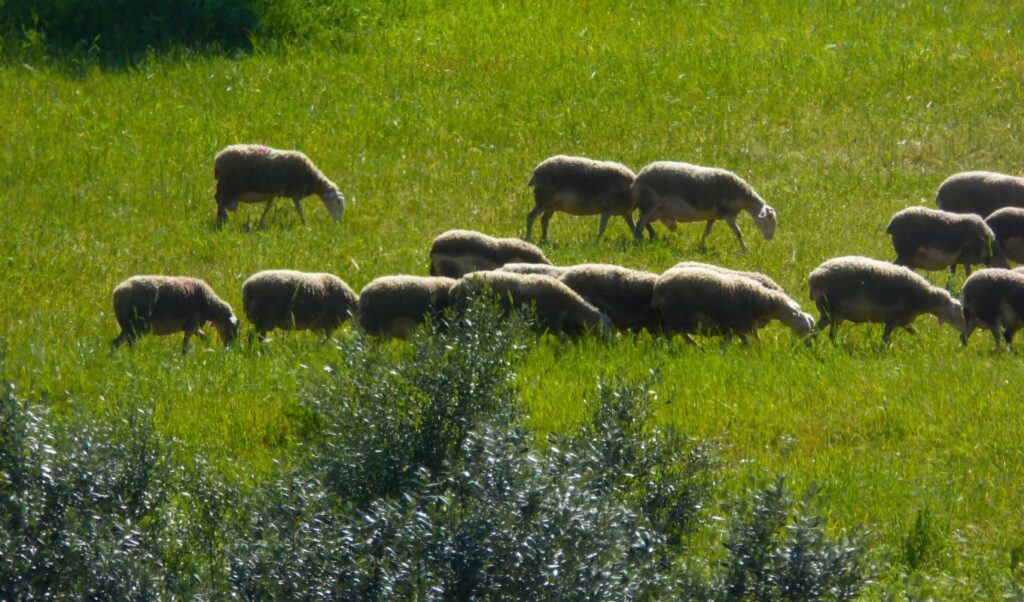The political leadership of the Ministry of Rural Development and Food agreed with the country’s regional governors on the need to coordinate actions to combat the spread of sheep and goat pox, during their meeting chaired by Minister Kostas Tsiaras. According to the decisions made, a ten-day action plan will be implemented unanimously, including the deployment of Ministry veterinarians in the field, intensification of on-site inspections, and encouragement of livestock farmers to maintain and implement biosecurity measures. Simultaneously, disinfection stations will be immediately established on main roads and key routes for the movement of live animals and transportation of animal feed and milk. The teams will maintain continuous presence, aiming for complete control and effective implementation of measures. As emphasized in the meeting, this is a “ten-day operation” with on-site presence of all Ministry personnel, with the exclusive goal of immediately halting the risk of pox spread. During his presentation, Minister of Rural Development and Food Kostas Tsiaras clarified that this is a zoonotic disease that is not easily addressed and therefore everyone is needed in this battle. He emphasized that the goal is to create a strong framework for combating the disease, noting that biosecurity measures must be strengthened, because “otherwise we will face a lockdown.” “The issue is that where we stand now, we must cooperate. The Regions, as those responsible for implementing measures, and all stakeholders must adopt a completely different approach to combat pox. This is an effort for all of us to take the step together to close this cycle,” he added.
Read: Satolias on Parapolitika 90.1 about pox: “200,000 sheep and goats have been culled, serious problem for animal and dairy products”
It’s worth noting that if a lockdown decision is made, all movements of sheep and goats within Greek territory will be prohibited and the animals will remain within stable facilities. Practically, this means that produced milk and meat will not be available in the market, although quantities are reduced during this season. However, the cost for livestock farmers, given the damage the sector has already suffered, is significant. According to data released by the Ministry, over the past year more than 262,000 sheep and goats have been culled due to pox, a number corresponding to 3% of the livestock capital.
See the tables with confirmed cases and animal deaths


After the meeting, Minister of Rural Development and Food Kostas Tsiaras stated:
“As you know, we have been facing pox for a long time, which creates a major threat to the country’s livestock capital. We just had the opportunity to complete a comprehensive meeting with the participation of several regional governors, thematic deputy governors, and several others via teleconference, in order to jointly coordinate actions that will enable us to limit pox as soon as possible.
The truth is – since all issues were raised in the discussion – that we identified those points that need to be highlighted for the best possible outcome of this effort.
We decided jointly – mainly in the direction of specific axes: to mobilize all the forces we have in the Ministry of Rural Development – and I’m talking of course about veterinarians – so that for the next ten days, through their on-site presence, in cooperation with DAOK veterinarians, they will intensify on-site inspections and encourage livestock farmers to maintain and implement biosecurity measures.
Secondly, to create disinfection stations on main road networks, especially in Regions currently affected by pox.
And thirdly, to create through the disinfection process the possibility for a specific certificate that will allow livestock farmers to deliver milk while ensuring biosecurity measures.
Many other issues were also discussed, such as quarantine for imported animals to reduce as much as possible the likelihood of transmitting the pox virus. As well as the possibility of supporting livestock farmers with disinfectants through the Regions, so we can strengthen as much as possible the framework and level of biosecurity for combating pox.
I think we are on a positive path and with the cooperation of all Regional Governors, whom I personally thank, and with everyone’s contribution – here at the Ministry of Rural Development and Food – we can take a really big step to address a zoonotic disease that has real difficulties and particularities.”
Thessaly Regional Governor Dimitris Kouretas emphasized: “I think today’s meeting was extremely useful. The decisions were unanimous, from all regional governors. These are the decisions the Minister told you about and I think ultimately this is the model that was once used for foot-and-mouth disease and succeeded. This is to be activated by the Ministry. It’s war and in war we are all together. We believe that in the coming period we will be able to control pox. This is a unanimous decision of all Regional Governors.”
Epirus Regional Governor Alekos Kachrimanis noted: “We are from a region that doesn’t have pox today, but we must protect our region and those livestock farmers who will move from mountainous to lowland areas. The discussion was very good and the fact that we all agreed during this emergency period is very positive.”
Deputy Regional Governor for Rural Economy of Central Macedonia Georgios Kefalas said: “Today’s meeting was extremely useful. We reached unanimous conclusions. As the previous speakers said, we have war so all together we use all means to address the emergency threat of pox.”
The meeting was attended by Deputy Ministers Christos Kellas and Giannis Andrianos, General Secretaries Spyros Protopsaltis and Antonis Filippis, Regional Governors of Thessaly Dimitris Kouretas, Eastern Macedonia and Thrace Christodoulos Topsidis, Epirus Alexandros Kachrimanis, Crete Stavros Arnoutakis, Deputy Regional Governors of Central Macedonia Giorgos Kefalas, Central Greece Kostas Apostolopoulos, Epirus Prodromos Gaitanidis, Western Greece Andreas Filias, South Aegean Filimon Zannetidis, the Ministry’s General Director of Veterinary Services Aikaterini Marinou and Service Officials. Western Macedonia Regional Governor Giorgos Amanatidis and Deputy Regional Governors of Crete Stavros Tzedakis, North Aegean Anastasia Antoneli and Ionian Islands Konstantinos Tsirigotis also participated via teleconference.




